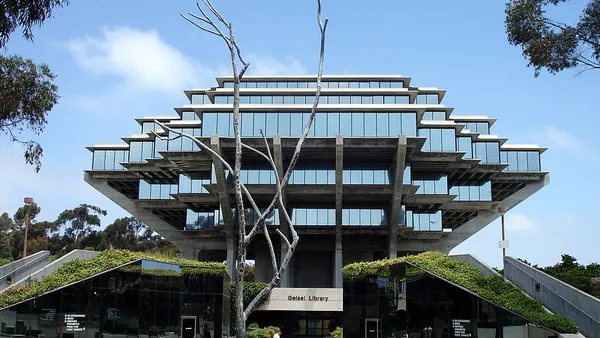Dive Brief
- A new climate organization called F Minus is calling on colleges and universities to cut ties with lobbyists who also work for fossil fuel companies.
- More than 150 institutions employed lobbyists in 2022 who also worked for the fossil fuel sector, according to the group.
- Some of the colleges named by F Minus have moved to divest their endowments from fossil fuel companies, including California State University, Dartmouth College, the University of Illinois and the University of Washington.
Dive Insight
The climate movement has routinely demanded colleges divest from the fossil fuel industry. But F Minus is taking a step beyond examining institutions’ direct relationships with fossil fuel companies.
Instead, it’s highlighting relationships with the individuals who support fossil fuel producers.
James Browning, executive director of F Minus and a former lobbyist, said universities’ relationships with fossil fuel-employed lobbyists are not particularly unusual in the industry, but they go against institutions’ stated values.
“If you look at the oil and gas lobbyists being hired by some of these colleges, frankly their impact on the climate crisis is far, far greater than anything the school is doing locally,” Browning said. “These are the people locking us into further dependence on oil and gas at a time when we just have to exit fossil fuels as quickly as possible.”
Browning highlighted Johns Hopkins University as an example of an institution working against its own goals by working with fossil fuel-employed lobbyists. The university announced in 2017 that it would be divesting its endowment from coal. But it employs lobbyists who also work for Koch Industries, a world leader in the coal industry.
Johns Hopkins did not respond to a request to comment.
Jasmine Banks, executive director of the climate group UnKoch My Campus and an F Minus board member, said the work is an important step in providing transparency about potential competing missions.
“We really need to make sure that the public and the community stakeholders understand where these overlapping conflicts of interest are,” Banks said. “We really want this critical civic and democratic institution to align not with corporate interests but with people and the planet.”
The group is not focusing only on higher education. Its database also includes fossil fuel-employed lobbyists who work for conservation groups, labor unions and other organizations.
The lobbyists on F Minus’s list have contracts with universities but aren’t direct employees. Browning said that he would like institutions to cut ties with these lobbyists, either by not renewing expiring contracts or by cutting them short.
“It’s going to be certainly a shock to some school officials that their lobbyists have these relationships. This has never been challenged in this way before,” Browning said. “Some of them probably don’t want to know.”
The University of Washington, which was called out in an F Minus press release, said it has contracted with lobbyist Stephen Buckner for several years and does not see a problem with his work for other clients. F Minus data lists Buckner as also lobbying for Marathon Petroleum.
“It is common for lobbyists to work for a variety of clients,” a UW spokesperson said via email. “His contracts with other clients have never presented a conflict of interest. Furthermore, one individual’s work for another entity does not outweigh the significant impact that UW researchers have made to address the climate crisis or other steps the University has taken itself.”
UW committed to divesting from direct fossil fuel holdings by 2027.
The California State University system said that it believes traditional energy companies are integral to the transition to a lower carbon economy.
“Our focus is to collaborate with industry to lead research and experimentation to develop the next generation of energy sustainability,” a spokesperson for the system said.
Dartmouth and the University of Illinois did not respond to requests to comment.












